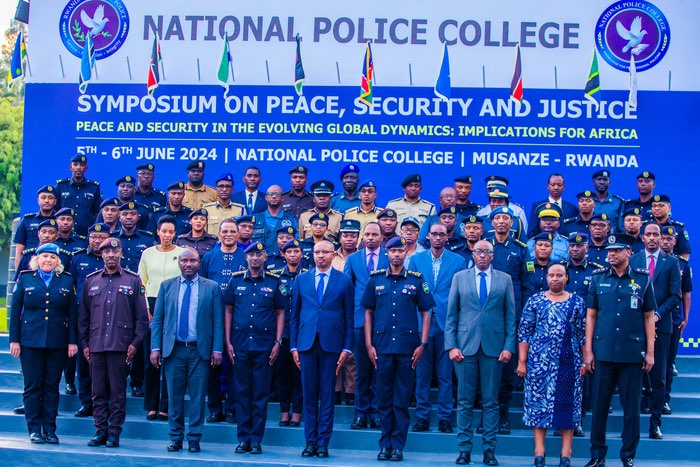
The 2024 symposium on Peace, Security and Justice concluded on Thursday, June 6, at the National Police College (NPC) in Musanze District with focus on Africa’s readiness for sustainable peace and prosperity as a forward looking approach.
Policymakers, scholars, researchers, and academicians gave insights on how to strengthen governance systems in Africa (institutional reforms in perspective); Africa’s economic integration: Leveraging the potentials of the AfCFTA; responsive and adaptive security approaches: promises of bilateral peace interventions/arrangements; and how Africa is prepared.
The Minister of Interior, Alfred Gasana, in his closing remarks, said that Africa has remained fragile due to constant security related issues.
“Current and future leaders need to learn from all those case studies to develop a forward-looking perspective that helps us to address current challenges, while preparing for future uncertainties,” Minister Gasana said.
He added: “In an attempt to build a resilient Africa, there is a need to think about a number of political, economic and security initiatives, which include regional and continental, bilateral as well as multilateral security arrangements.”
The Police Senior Command and Staff Course, which includes the annual symposium, he said, is a better way to raise strategic leaders, managers and commanders with the same understanding and ability to contribute to peace and security in African countries.
Insights from panelists
Dr. Monique Nsanzabaganwa, the Deputy Chairperson of the African Union Commission, while talking the aspect of “strengthening governance systems in Africa: Institutional reforms in perspective”, said: “We are only stronger together, no one has an obligation to care for us; they come with geopolitical pressure for their survival…we have to realize that indeed we are at that battlefield and survival will be for fittest; we better be prepared.
She added: “We should keep a Pan-African kind of narrative that is uplifting the image of the continent while knowing that there are systems that are working and keep hope that actually we are getting there, and it will become a self fulfilling prophecy.”
Dr. Brian Tamuka Kagoro of Global Pan African Movement and a lawyer, while reacting on the same topic, said that those who studied sciences (STEM) in most African countries, are likely to find jobs outside the continent because countries are not investing in institutions, factories and industrialization processes that would make STEM subjects relevant.
On youth consciousness, he argued that it would be pointless if their doubts are going to undermine the values of consciousness and patriotism.
With the growing sector of religion, he believes that it is crucial for governments and the faith-based sector, which controls the mass opinion, to work together to transform the mindset or political consciousness of the citizens.
Brig. Gen. Ronald Rwivanga, the RDF Spokesperson, gave insights on responsive and adaptive security approaches: promises of bilateral peace interventions/arrangements.
He narrowed his focus on the current threat of terrorism and violent extremism as well as non-state actors threatening to topple legitimately elected governments through violent means.
He argued that the decision to adopt violent or non violent approaches or use of military force versus political or diplomatic approaches to resolve such conflicts depends on the circumstances and causes of the conflict (no one shoe fits all).
On peacekeeping operations versus Rwanda’s bilateral engagements, using an example of Mozambique and the Central African Republic, he noted that a blended approach is the most effective.
“It is very important for us to move fast to deal with the problem using bilateral engagements but we also need multilateral partners to come and keep that peace. Rwanda’s bilateral intervention received multilateral consent from AU and UN because interventions were justified.”
Other approaches adopted by Rwandan security forces, he said, are meant to bring stability. “Once the guns go silent, we begin our work because among our constitutional roles as RDF and RNP, we are also mandated to carry out certain socio-economic transformation activities. We support the communities that we seek to protect.”
Prof. Sylvestre Nzahabwanayo, the Director of the Institute of Research and Dialogue for Peace, put his focus on “youth centred peace education as a pathway to a resilient Africa.
He said that one cannot envisage a resilient Africa later alone a peaceful and sustainable Africa while turning blind eyes on the youth.
“A youth centred peace education and youth led peaceful initiatives are critical pathways for a resilient Africa.”
He called for revamping of youth-led peacebuilding initiatives and platforms that bring together youth representing their countries to identify threats to peace on the continent and devise strategies well in advance to counteract those threats. He saluted initiatives such as African Union Youth Assembly (AUYA), Youth for Peace (Y4P) Africa Programme, and the AU Continental Framework on Youth Peace and Security (CFYPS), and African Youth Parliaments (AYP).
Dr. Donald Kaberuka, the African Union Covid-19 Special Envoy, in his insights on how ready Africa is, said that it requires building trenches which shape the continent for a long time, from demographics, urbanization, digitalization, geopolitical to climate change.
Using an example of Covid-19 response, he said that South Korea, Vietnam, and Rwanda were the countries that responded reasonably well. To this, he noted that readiness doesn’t mean having fat cheques and resources but rather about having systems; building functioning, clean and accountable states, which delivers services and govern for all not for the few. (End)
